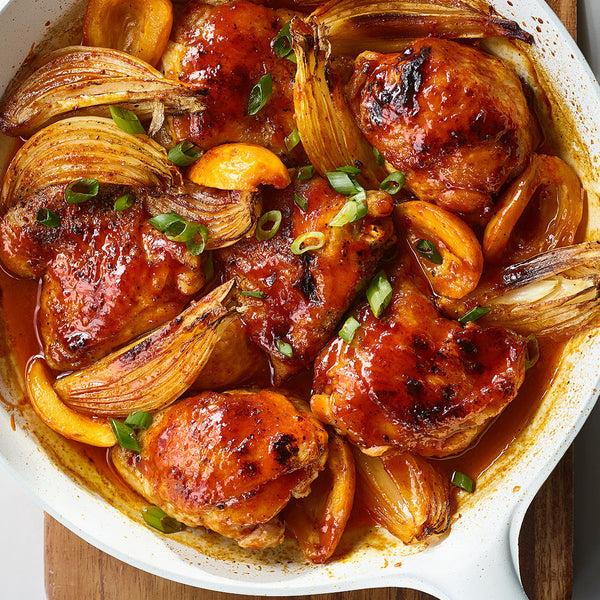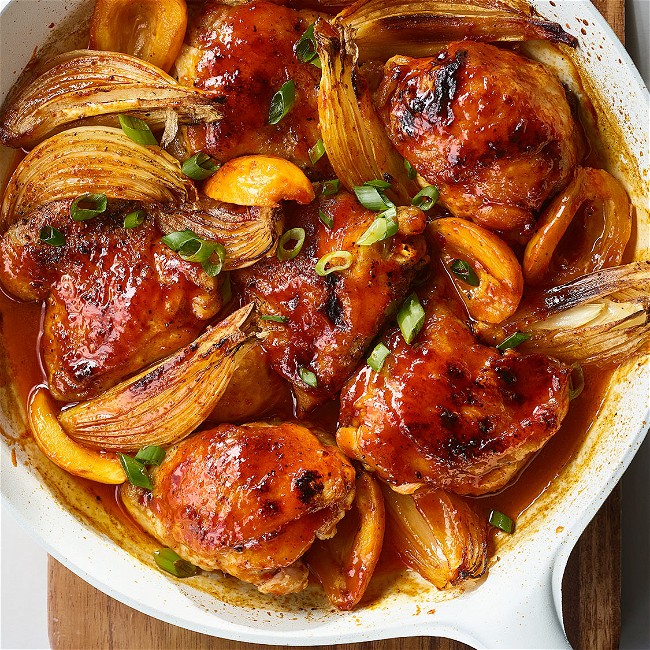
Harissa Honey Chicken with Apricot
Juicy, marinade-friendly, and pleasingly rich, chicken thighs are as popular in Israel as skinless, boneless chicken breasts are in the United States. The harissa-honey glaze helps burnish and crisp the skin and does its part in creating a pan sauce. To take advantage of the loquat’s very short season, I threw some of those in the pan, but apricots, peaches—even tomato wedges—work beautifully here.
Harissa Honey Chicken with Apricot
Category
Main Course
Servings/Yield
4
Author
Adeena Sussman, adapted from Sababa, by Helen Park

Ingredients
- 1¼ cups low-sodium chicken broth
- 4 Tbsp La Boite Harissa Honey
- 1 Tbsp sherry vinegar
-
2 tsp Rub Adom
- 1½ tsp kosher salt, plus more for seasoning
- 1½ tsp cornstarch
- 5 to 6 skin-on, boneless chicken thighs (about 1¾ pounds), patted dry
-
Freshly ground black pepper to taste
- 2 Tbsp extra-virgin olive oil
- 3 small onions (red or white), each cut into 4 wedges through the root (see Recipe Notes)
- 3 medium loquats or apricots, halved
- Thinly sliced scallions (green parts only) or chopped chives, for garnish
- Rice, for serving
- -
-
½ cup Izak blend (60g)
-
1 tsp fine sea salt (6g)
-
1 tsp Peperoncini
- ½ cup vegetable oil (100g)
- ¼ cup white vinegar (56g)
- 2 Tbsp honey (30g)
Harissa Honey
Directions
For the Harissa Honey
- In a heat-safe bowl mix the Izak, salt, and peperoncini well to combine.
- In a small, heavy bottom pot, heat the oil until hot but not smoking (350°F).
- Pour the hot oil over the spices in the bowl and stir to distribute the oil well.
- Once the sizzling has subsided, add the white vinegar and honey and stir well again.
- Set aside to cool to room temperature.
- The harissa honey is ready at this point but can be stored in an airtight container refrigerated.
For the Chicken
- Arrange a rack in the upper third of the oven and preheat the broiler.
- In a medium bowl, whisk together the broth, harissa, honey, vinegar, salt, and cornstarch. Season the chicken thighs generously with salt and pepper.
- Heat the olive oil in a large (at least 10-inch) oven-safe skillet over medium-high heat.
- Add the chicken to the skillet, skin-side down, and cook without moving until the skin is browned and crisp, 4 to 5 minutes.
- Flip the chicken and cook until the underside is browned, 4 more minutes.
- Remove to a plate and drain and discard all but 2 tablespoons of the fat from the skillet. Reduce the heat to medium and arrange the onions in the skillet with one of the flat sides touching the surface of the skillet. Cook until the onions are golden on the underside, 2 to 3 minutes. F
Flip the onions and brown the underside an additional 2 to 3 minutes.
- Add the harissa-honey liquid to the skillet, raise the heat to medium-high, and cook until the mixture thickens, 3 to 4 minutes.
- Nestle the chicken skin-side up in the pan. Add the fruit and cook the chicken, spooning some of the sauce over the skin, until the fruit begins to soften slightly, 2 to 3 minutes.
- Transfer the skillet to the oven and broil until the skin crisps, the liquid thickens further, and the chicken is cooked through, 3 to 4 minutes for smaller thighs, 6 to 7 minutes for larger ones.
- Remove the chicken from the oven and garnish with scallions. Divide among plates and spoon the sauce over the top. Serve with rice.
Recipe Note
Recipe Notes
Leaving the root end of an onion intact ensures that when you cut the onion into wedges, they have a better chance of holding their shape.
The original title of this recipe is Harissa-Honey Pargiyot from Adeena Sussman’s book Sababa. Though the actual definition of pargit is “baby chicken” or “Cornish hen,” what we’re actually talking about here are dark-meat boneless chicken thighs. Juicy, marinade-friendly, and pleasingly rich, they’re as popular in Israel as skinless, boneless chicken breasts are in the United States. For this recipe, she asks the butcher to leave the skin on.
If you are already, keep into cooking through every page of Adeena’s book feel free to use the Honey Harissa recipe in Sababa.
Questions? Contact helen@laboiteny.com


